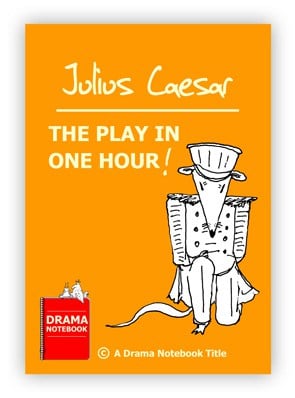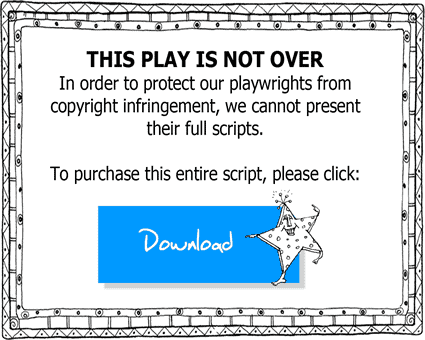In these turbulent political times, Shakespeare’s Julius Caesar has renewed relevance. Use this shortened version of the play to put on a production, or to start a dialogue with your students on the subject of tyranny.
This abridged version of ‘Julius Caesar’ was professionally edited by a former Oregon Shakespeare Festival actor. The script maintains the integrity of the play while significantly shortening it-making it easier for groups to perform.
Similar versions of abridged Shakespeare plays sell for $15 to $100 or more-if you can even find them! On Drama Notebook, it is part of your membership and there are no royalties if there is no admission for performance.
Excerpt from the play:
DRAMATIS PERSONAE
SOOTHSAYER CHORUS: 3-6 Members; can tell the future
FLAVIUS: a citizen non-supporter of Julius Caesar; can double as a conspirator
MARULLUS: a citizen non-supporter of Julius Caesar; can double as a conspirator
JULIUS CAESAR: a warrior/ politician; the soon-to-be ruler of Rome; later, a GHOST
MARK ANTONY: a warrior/ politician; Julius Caesar’s closest advisor
BRUTUS: a warrior/ politician; very noble at heart
CASSIUS: a warrior/ politician; leader of the conspirators against Julius Caesar
CASCA: a politician; a conspirator
DECIUS: a politician; a conspirator
METELLUS CIMBER: a politician; a conspirator
TREBONIUS: a politician; a conspirator
CINNA: a politician; a conspirator
PORTIA: Wife to Brutus
CALPURNIA: Wife to Julius Caesar
LUCIUS: a young assistant to Brutus
OCTAVIUS CAESAR: Nephew to Julius; joins Antony’s army, and later becomes ruler of Rome
CINNA [the Poet]: a statesman; assistant to Octavius Caesar; mistaken for Cinna the Conspirator
FOUR CITIZENS: angry, riotous townsfolk; easily manipulated; can be doubled with the Soothsayers or other roles
Act I
Scene 1
Rome. A public street.
(Enter a 3 to 6 person CHORUS of SOOTHSAYERS, from different parts of the theatre, slowly and neutrally walking toward one another.)
Soothsayers. (Speaking all together, separately, chanting, repeating, whispering, yelling, etc. — Director’s choice:)
Beware the Ides of March…
(Enter FLAVIUS and MARULLUS, berating the Chorus, like they were mere townsfolk:)
Flavius.
Hence! home, you idle creatures get you home!
Marullus.
Why dost thou wander about in the streets?
Sooth.
To see Caesar and to rejoice in his triumph.
Marullus.
Wherefore rejoice? What conquest brings he home?
You blocks, you stones, you worse than senseless things!
Flavius.
Be gone!
(Exit SOOTHSAYER CHORUS, from either side of the stage, into the wings — neutrally, creepily — not in a hurry at all. MARULLUS and FLAVIUS turn to the audience, and become NARRATORS:)
Marullus/ Narrator.
At this moment, Rome is in a time of great political transition… the army of Julius Caesar has just defeated the army of former ruler, Pompey, and Caesar will soon take the crown…
Flavius/ Narrator.
…Which divides the people of Rome in half… one half for, and one half against, the man who would be king. Already, a rebellion has begun brewing…
(They Exit, as…)
Scene 2
Same.
(Quickly, we hear a flourish of regal or political greeting music.
Enter CAESAR, ANTONY, CALPURNIA, PORTIA, DECIUS, BRUTUS, CASSIUS, CASCA, and CINNA [the Poet].
Suddenly, Enter the SOOTHSAYER CHORUS from their respective wings of the stage; they fan out, surrounding the group.)
Sooth.
Caesar!
Caesar. (As he and his train approach the stage)
Huh! who calls?
Who is it in the press that calls on me?
I hear a tongue, shriller than all the music,
Cry ‘Caesar!’ Speak; Caesar is turn’d to hear.
Sooth.
Beware the ides of March.
Caesar.
What?
Brutus.
Some “soothsayers” bid you beware the ides of March.
Cassius.
Fellows — look upon Caesar.
Caesar. (on the stage by now)
What say’st thou to me now? speak once again.
Sooth.
Beware the ides of March.
Caesar.
Ha! They are dreamers; let us leave them.
(Another flourish.
Exeunt all, except BRUTUS and CASSIUS.)
Cassius.
Will you go see the order of the course?
Brutus.
Not I, Cassius, I’ll leave you.
Cassius.
Tell me, good Brutus, can you see your face?
Brutus.
No, Cassius; for the eye sees not itself,
But by reflection.
Cassius.
And it is very much lamented, Brutus,
That you have no such mirrors as will turn
Your hidden worthiness into your eye,
That you might see your shadow.
Many of the best respect in Rome,
Except immortal Caesar,
Have wish’d that noble Brutus had his eyes.
Brutus.
Into what dangers would you lead me, Cassius?…
(Quick music flourish, and shouts, from offstage.)
Brutus.
…What means this shouting? I do fear the people
Choose Caesar for their king.
Cassius.
Ay, do you fear it?
Then must I think you would not have it so.
Brutus.
I would not, Cassius; yet I love him well.
But wherefore do you hold me here so long?
What is it that you would impart to me?
Cassius.
I was born free as Caesar; so were you;
We both have fed as well, and we can both
Endure the winter’s cold as well as he…
And this man
Is now become a god, and Cassius is
A wretched creature and must bend his body,
If Caesar carelessly but nod on him!
Why Subscribe?
 Inside Drama Notebook, you will find a huge collection of well-organized lesson plans, scripts for kids, drama activities, 50 drama games on video and more! Join today and dramatically reduce your planning time while delivering fresh, innovative drama lessons to your students! If you are new to teaching drama, this site will be a Godsend! You will immediately feel confident about teaching drama like an expert. The site guides you step-by-step and provides you with materials that you can use right away with your students.
Inside Drama Notebook, you will find a huge collection of well-organized lesson plans, scripts for kids, drama activities, 50 drama games on video and more! Join today and dramatically reduce your planning time while delivering fresh, innovative drama lessons to your students! If you are new to teaching drama, this site will be a Godsend! You will immediately feel confident about teaching drama like an expert. The site guides you step-by-step and provides you with materials that you can use right away with your students.
If you have been teaching for years, Drama Notebook will inspire you with a fresh new approach and innovative ideas!
The site is packed with original, innovative lessons and activities that you will not find anywhere else—and new materials are added monthly.


















